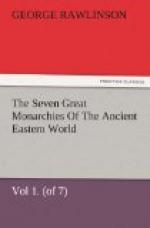The evils proceeding from a burning temperature are augmented in places under the influence of winds, which, arising suddenly, fill the air with an impalpable sand, sometimes circling about a point, sometimes driving with furious force across a wide extent of country. The heated particles, by their contact with the atmosphere, increase its fervid glow, and, penetrating by the nose and mouth, dry up the moisture of the tongue, parch the throat, and irritate or even choke the lungs. Earth and sky are alike concealed by the dusty storm, through which no object can be distinguished that is removed many yards; a lurid gleam surrounds the traveller, and seems to accompany him as he moves: every landmark is hid from view; and to the danger of suffocation is added that of becoming bewildered and losing all knowledge of the road. Such are the perils encountered in the present condition of the country. It may be doubted, however, if in the times with which we are here concerned the evils just described had an existence. The sands of Chaldaea, which are still progressive and advancing, seem to have reached it from the Arabian Desert, to which they properly belong: year by year the drifts gain upon the alluvium, and threaten to spread over the whole country. If we may calculate the earlier by the present rate of progress, we must conclude that anciently these shifting sands had at any rate not crossed the Euphrates.
If the heat of summer be thus fierce and trying, the cold of winter must be pronounced to be very moderate. Frost, indeed, is not unknown in the country: but the frosts are only slight. Keen winds blow from the north, and in the morning the ground is often whitened by the congelation of the dew; the Arabs, impatient of a low temperature, droop and flag; but there is at no time any severity of cold; ice rarely forms in the marshes; snow is unknown; and the thermometer, even on the grass, does not often sink below 30 deg. The Persian kings passed their winter in Babylon, on account of the mildness of the climate; and Indian princes, expelled from the Peninsula, are wont, from a similar cause, to fix their residence at Busrah or Baghdad. The cold of which travellers speak is relative rather than positive. The range of the thermometer in Lower Chaldoea is perhaps 100 deg., whereas in England it is scarcely 80 deg., there is thus a greater difference between the heat of summer and the cold of winter there than here; but the actual greatest cold—that which benumbs the Arabs and makes them fall from their horses—is no more than we often experience in April, or even in May.




